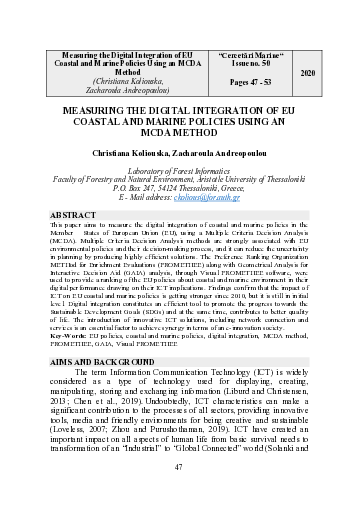Measuring the Digital Integration of EU Coastal and Marine Policies Using an MCDA Method
DOI:
https://doi.org/10.55268/CM.2020.50.47Keywords:
EU policies, coastal and marine policies, digital integration, MCDA method, PROMETHEE, GAIA, Visual PROMETHEEAbstract
This paper aims to measure the digital integration of coastal and marine policies in the Member – States of European Union (EU), using a Multiple Criteria Decision Analysis (MCDA). Multiple Criteria Decision Analysis methods are strongly associated with EU environmental policies and their decision-making process, and it can reduce the uncertainty in planning by producing highly efficient solutions. The Preference Ranking Organization METHod for Enrichment Evaluations (PROMETHEE) along with Geometrical Analysis for Interactive Decision Aid (GAIA) analysis, through Visual PROMETHEE software, were used to provide a ranking of the EU policies about coastal and marine environment in their digital performance drawing on their ICT implications. Findings confirm that the impact of ICT on EU coastal and marine policies is getting stronger since 2010, but it is still in initial level. Digital integration constitutes an efficient tool to promote the progress towards the Sustainable Development Goals (SDGs) and at the same time, contributes to better quality of life. The introduction of innovative ICT solutions, including network connection and services is an essential factor to achieve synergy in terms of an e-innovation society.
Downloads
Published
2020-12-20
How to Cite
Koliouska, C., & Andreopoulou, Z. (2020). Measuring the Digital Integration of EU Coastal and Marine Policies Using an MCDA Method. Cercetări Marine - Recherches Marines, 50(1), 47–53. https://doi.org/10.55268/CM.2020.50.47
Issue
Section
ORIGINAL ARTICLES
License
This is an open access journal, which means that all content is freely available without charge to the user or his/her institution. Users are allowed to read, download, copy, distribute, print, search, or link to the full texts of the articles, or use them for any other lawful purpose, without asking prior permission from the publisher or the author. This is in accordance with the BOAI definition of open access.






